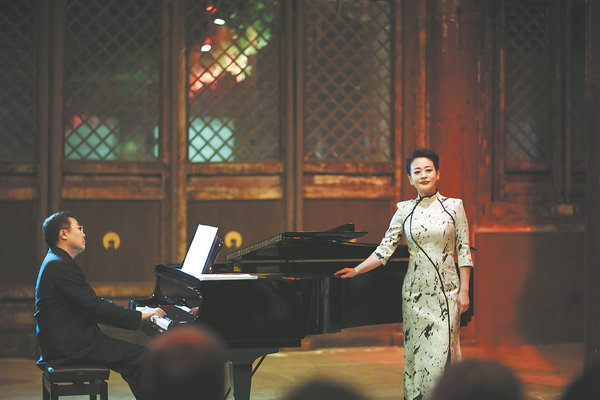

When collaborative pianist Zhang Jialin was researching early modern Chinese art songs, he found a number of pieces that are rarely performed today.
One of them was Da Jiang Dong Qu, or "The Great River Goes East", which was composed by songwriter Qing Zhu (1893-1959) during his studies in Germany in 1920, and is based on the poem, Memories of the Past at Red Cliff, by ancient literati and artist Su Shi of the Song Dynasty (960-1279).
"The Great River Goes East is considered a masterpiece of Qing Zhu, and one of the first contemporary Chinese art songs. The songwriter cleverly combined Western composition techniques with Chinese classical poetry, allowing the poem to once again exude new brilliance through the music," says Zhang, a professor of the Central Conservatory of Music in Beijing, adding that Chinese art songs are greatly connected to ancient and contemporary Chinese poems.
"Students at music schools are very familiar with Chinese art songs, because they sing them in their classes. However, for the audience, Chinese art songs are not as popular and are rarely heard in concert halls," he says. "They have great value and deserve to be heard by more people."
Zhang's passion for Chinese art songs and his wish to popularize these "hidden treasures" has led him to team up with his wife, soprano Gan Lulu, and stage concerts.
On Saturday, the couple will perform a concert at Tianjin's Anglican Art Centre, an old building formerly known as the Anglican Church, which was built in 1903 by British Sinologist and architect Arthur Christopher Moule.
Besides songs written by Qing Zhu, whose real name was Liao Shangguo, the couple will also sing songs written by Ellinor Valesby (1894-1969), a German harpist and composer, who came to China in 1926 with her then husband Qing Zhu.
"Despite their short marriage, Valesby, who could not read or write Chinese, wrote nearly 20 art songs for Chinese classical poetry, which aroused widespread discussion in Chinese music and cultural circles at that time," says Zhang.
The couple will perform songs co-written by Qing Zhu and Valesby, including Song of Zhang Sheng, the lyrics of which are based on the classic Romance of the Western Chamber, by Yuan Dynasty (1271-1368) playwright Wang Shifu, and Thoughts on a Tranquil Night, composed by Valesby and with lyrics based on Tang Dynasty (618-907) poet Li Bai's poem of the same title.
Gan notes that the couple already held a concert introducing these Chinese art songs in Beijing on March 1 at The Temple, a space for live music located inside the capital's 600-year-old Songzhu Temple.
"When we staged the concert, the audience gave us warm feedback, though some of them might have been hearing the songs for the first time. They read the lyrics while listening to the music. It was a treasured vocal art journey," says Gan, who is teaching vocal music at the Central Academy of Drama in Beijing.
They have also performed Chinese art songs at Peking University and the National Centre for the Performing Arts in Beijing.
Gan adds that as a music student, she was intrigued by Chinese art songs since childhood, just like her husband, whose parents are both musicians.
"It's quite challenging for me to sing Chinese art songs because they are combined with Chinese poems. Unlike singing in an opera, in which I use my voice to portray a character, I have to try to deliver the beauty of those poems," says Gan.
Besides celebrating the profound contribution to Chinese art songs by both Qing Zhu and Valesby, the concert will also feature pieces written by the patriotic composer and music educator Huang Zi (1904-1938), including The Whisper of the West Wind, Missing Homelands and Spring Nostalgia. To allow the audience to gain a full understanding, Zhang will introduce each song during the concert in Tianjin.